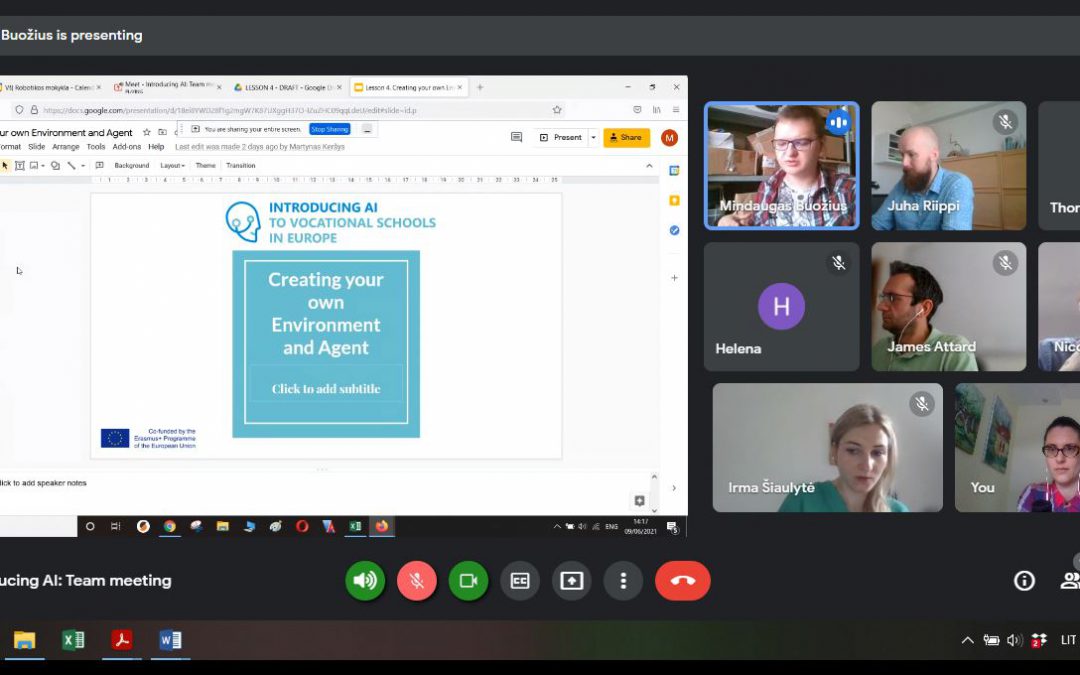The project runs for the most part according to the activity and time plan set in the Gantt chart. During the first months of the project implementation, the partners set the main principles of cooperation, established local work groups, and started with the intellectual output development activities.
At this stage, we have accomplished the development of most of the lesson materials for all three topics Autonomous Driving with Computer Vision, Machine Learning Agents in Game Design, and Robotic Arm and Computer Vision (O1). Each topic will cover 20 contact hours and consist of 4 lessons. Lessons were developed in an iterative fashion with multiple internal tests before the course material was given to the teachers in the project group for testing. The produced materials are continuously uploaded on the website play.gaminu.eu. We will add 1-1,5 months for the creation of the rest of materials as this process proved to require more time due to the complexity and specifics of the topics.
Additional piloting of the product was implemented through lesson-by-lesson testing activities which were not initially planned in the application. This was done in order to get instant feedback from teachers and students about the developed lesson materials. For this matter, survey forms were created. They contain evaluation of different aspects of the materials (contents, structure, methodology, theoretical part, practical tasks, effect on students’ learning, problems and suggestions for improvement) (O2). The teacher questionnaire has to be filled after testing each lesson of each topic.
Between February and June, all four partner schools KITM, Sedu, TAI and MCAST tested the first two lessons of selected topics with the groups of their students. These lessons did not require any hardware and could be delivered online. Teachers gave valuable feedback through the survey and during team meetings, which allowed the developers to make improvements and follow the general suggestions of teachers for the lessons yet to be created. Testing will continue at MCAST until July as they will be able to have students on-site, as well as the necessary hardware already available (robotic arm, conveyor belt, etc.).
Validation of the materials in full scope will be carried out in the next school year by all partner schools. In preparation for that, MCAST, Sedu and TAI have started the purchase of necessary equipment (under the Exceptional costs budget item) needed for testing.
Project’s international team has had online meetings each month. The participants include project coordinators, material developers, heads of IT units, and teachers. This combination allows us to exchange information and opinions as well as plan the next activities in the most effective way.
Kickoff meeting was also held online, on November 10th, 2020. The agenda included: introduction of participants and partner organizations; presentation of the project; presentation and discussion of the IOs; discussion and decision making on different aspects of the project management (communication, dissemination, budget management, monitoring, etc.); evaluation of the event. Different sessions of the meeting were attended by 23 representatives of partner organizations.
The interim meeting, which was planned in Malta in May, was postponed to a later time. However, to evaluate the first period of the project, partner Sedu (responsible for research) initiated an internal survey to evaluate the progress in the project. The results of the survey indicated that all respondents were either satisfied (75%) or very satisfied (25%) with the overall implementation of the project. There was good feedback received on how the project is managed – the iterative process, learning from mistakes, and implementing improvements.
Robotikos mokykla has created and published the project’s website ai.gaminu.eu. It contains the main information about the project’s goals, activities and planned outcomes. The News section contains articles about the main accomplishments of the project in general and in partner organizations.
On the website play.gaminu.eu, which is the platform for the lesson materials developed in the project, a separate course category dedicated to this project was created. The link to them was shared with internal project users and testers (teachers and students within the partnership). At a later stage, the materials on the platform will be actively promoted among interested parties and the wide public.

